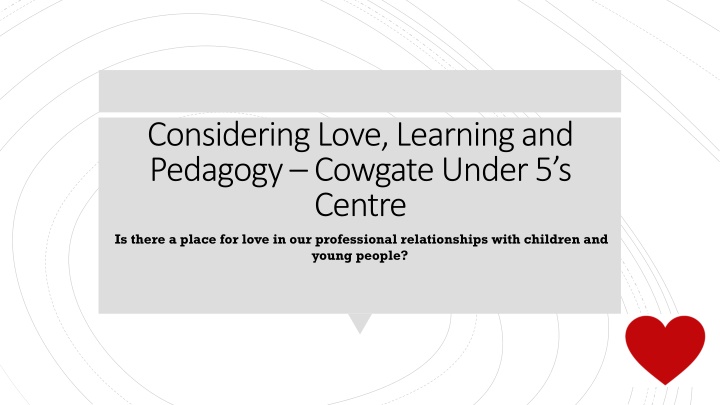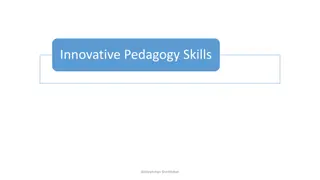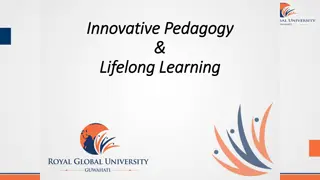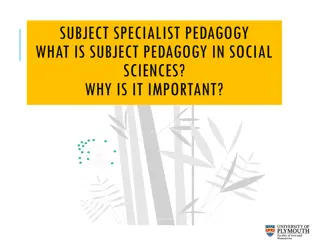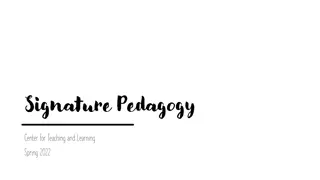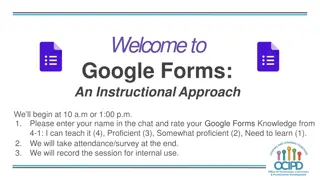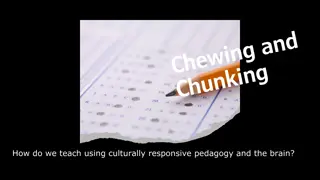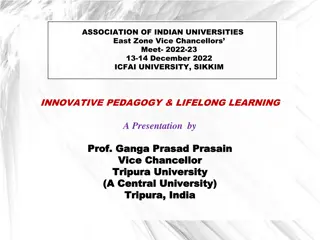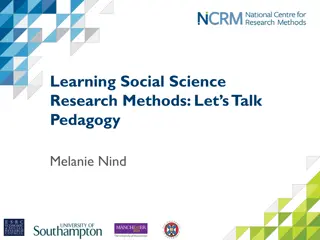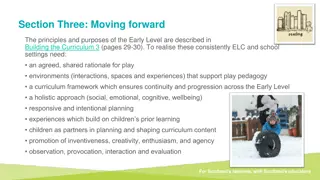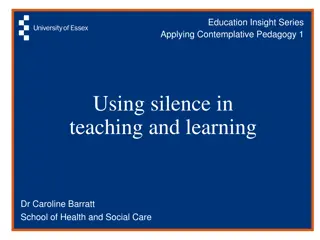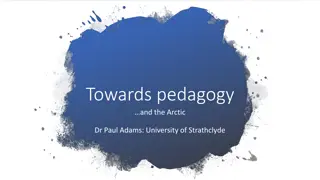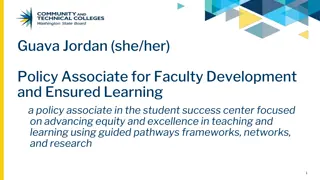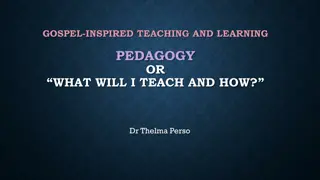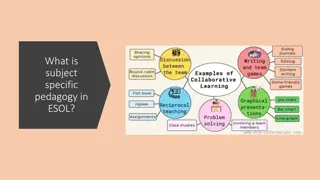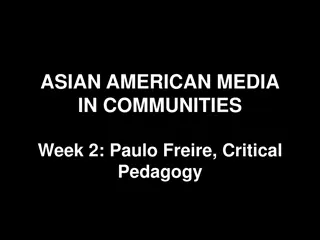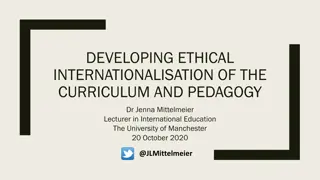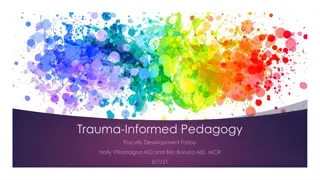The Role of Love in Educational Pedagogy
Exploring the significance of love in professional relationships with children and young people, this content emphasizes the importance of kindness, care, and nurturing in education. Various scholars argue that a pedagogy of love can inspire learning, foster growth, and create a supportive environment for individual differences to flourish. Love is viewed as a powerful tool in teaching and learning, leading to meaningful engagement and empowering students to challenge knowledge. Ultimately, incorporating love in pedagogy can enhance the learning experience beyond traditional behavioral approaches.
Download Presentation

Please find below an Image/Link to download the presentation.
The content on the website is provided AS IS for your information and personal use only. It may not be sold, licensed, or shared on other websites without obtaining consent from the author.If you encounter any issues during the download, it is possible that the publisher has removed the file from their server.
You are allowed to download the files provided on this website for personal or commercial use, subject to the condition that they are used lawfully. All files are the property of their respective owners.
The content on the website is provided AS IS for your information and personal use only. It may not be sold, licensed, or shared on other websites without obtaining consent from the author.
E N D
Presentation Transcript
Considering Love, Learning and Pedagogy Cowgate Under 5 s Centre Is there a place for love in our professional relationships with children and young people?
Cowgateunder 5s Centre A pedagogy of love can only occur in an environment in which kindness exists. Cho (2005) argues that there is a place for love in pedagogy
In The Challenge to Care in Schools: An Alternative Approach to Education - Nel Noddings (2005) insists that the main aim of education should be a moral one, that of nurturing the growth of competent, caring, loving, and lovable persons. To that end she describes in great detail a curriculum organized around centres of care: care for one s self; for intimate others as well as strangers and distant others; for animals, plants, the earth; and for human instruments and ideas.
Not a school, not a home, but homelike Froebel. Friedrich Froebel Friedrich Froebel Uniqueness of children Acknowledgement of the differences Each child has unique talents, abilities and interests in need of attunement / engagement by caring proactitioners.
The positive impact love can have on learning has been succinctly described by Cho (2005) who argues that love has the power to inspire [children] to seek after knowledge, love can unite the [practitioner] and [child] in the quest for knowledge, and the love of learning can even empower [children] to challenge knowledge thereby pushing its limits (Cho, 2005 :79).
If one wants to engage in truly meaning- ful learning of complex ideas, feelings, beliefs, and values, then a purely behavioural approach will prove inadequate. Pedagogy is the employment of methods of teaching and learning that are directed towards an end goal as part of a broader education. When one speaks of love as pedagogy, one is referring to the use of love in teaching and learning to attain mutually desirable ends. Activity is purposeful, and takes place against the backdrop of love (Loreman, 2011:9) .
Definitions of Love ...the word love is used in an astounding array of situations to describe an enormous range of attitudes, emotions, feelings, and behaviours toward objects and people. In this respect, love is not different from many other words, for all human language is characterised by polysemy (Berscheid, 2006:172). Friere s philosophy of striving for humanness by shaking off oppression through unity and criticism offers much to the discussion of love as pedagogy.
Love, means many things to many people, and is a term with different connotations depending on context.
What the children have to say
I have made three symbols of love Arthur, aged 4 years. While most educators acknowledge the need for caring environments in which warm, personal relationships are fostered between teacher and learner, few have taken the time to address what this actually means (Loreman, 2011:1)
Love in Action Community and Acceptance Interactions are intimate, safe, caring, and warm.
Infusing Love into Daily Pedagogy T ....yes Gael I wove you Teresa I love you to Gael ......and I wove Stickland! T-How does that feel? Like your heart comes up to your ears! It might be more productive to examine our individual conceptualisations and experiences of love in the time, place, and cultural contexts in which they occur.
.. general discomfort with talking about love and education, and also fears that writing about love and pedagogy might provide some with the motivation to cross professional and ethical boundaries with those whom they teach. There *should* be a place for love in our professional relationships with children and young people. My feeling is that we have become so scared of these relationships being deemed inappropriate because of fears about paedophilia, that love is often avoided. Additionally, schools and society in general are so focused on a narrow definition of intellectual development, measured by numeracy and literacy, that we hardly ever stop to ask "is the child learning to love others?". And while the family is the primary place where a child learns to love and be loved, it should not be the only place; not all children are lucky enough to have loving families. The parents responses However, it must be much more emotionally tiring to try and bring love to children every day in a setting like a school, and I can see why and how teachers have maintain some kind of distance (parent 1, October 2018).
The fact that love and its links to pedagogy are uncomfortable topics for some might have a basis in many of the by now well-known stories of sexually predatory educators taking advantage of children. Cho (2005), in his examination of love as pedagogy in relation to sexual scandals, notes that the line between love and sex can be ill defined and vague, and using an example of documented [practitioner] [child] sex describes the boundary as porous. There no place for sexual relationships between [practitioners] and [children] in educational contexts, but also that pursuit of such relationships in these circumstances is a betrayal of love and should be rigorously condemned. Distorted ideas of love should not be used as leverage by those wielding power who wish to take advantage of their students. One of the foundational premises of this text is that love can be entirely non- sexual in nature, and that indeed it is this non-sexual love that is pedagogically beneficial and recommended.
Professionally and ethically appropriate ways in which love can be used as the fundamental basis of pedagogical work. Just to say that my feeling is that there is always place for love in professional relationships because love embodies the essences of humanity, warmth, kindness and nurture that our children and young people should be surrounded by. Because of work many many parents can't always be there to be the loving presence during their child's day and it is vital that the people who are with our children feel able and supported to be a loving person to them. I'm not sure if these thoughts are along the right lines for your work but i'd be happy if they were shared (parent 2, October 2018). Parental responses
The Greeks helpfully spoke about six different kinds of love, described here, with some lovely phrases that feel v appropriate to Cowgate - https://en.m.wikipedia.org/wiki/Greek_words_for_lov e Parental responses Eg affectionate regard between equals or willing the good of another ... (parent 3, October 2018).
Love in Action? I think love and true affection are an essential part of our role and I personally feel very strongly that this should be expressed in how we are with the children we care for. Some of us and some settings might not feel comfortable with how we express these feelings. I know that I have genuinely felt love inside me for the children I have cared for and currently care for. In my experience children respond to this feeing of love and care. I personally express this physically through cuddles and do kiss the younger children on their cheeks or head, depending on the moment. Children might ask for a cuddle, Andrew will regularly ask for a cuddle and wants to kiss me as part of this. Accepting a cuddle and a kiss is also part of the picture as the children do become attached to certain members of staff. Love, and our ability to give and receive love is an essential element of life. Practitioner Responses Love is also about supporting independence, resilience etc Warm wishes Helen
Challenge conventional views on teaching and learning, practitioners critique and reflect on not only their own practices, but those evident in the contexts and systems in which they work. On love - of course we end up loving the children but prob some more than others, that's where we are professional. when I struggle sometimes in my relationship to a child I imagine I am their parent so I practice at love - it helps me see their best side and their vulnerabilities and makes me more understanding. The area of love that is not talked about I think is parents love for professionals who show love for their child. Hence I loved 18 year old Sammie from nursery because Rose loved her and I could see Sammie loved Rose, and Sammie came to my house once a week so I could go to a choir, and she put Rose to bed and Rose was happy. And I loved Collette because she cared for Rose too. And I love Jane and Teresa and Lian. I don't know how other parents feel. There is much research on how parents might look down on staff as paid carers, and there is work on the professional love of caring, but has anyone researched the love that parents might have to adults who care for their child? or their love for midwives or health visitors who give them extra care. I loved the 2 nurses at st johns that I saw once a week for 6 months to help change bandages of Rose's arm. Or also how these adults might love parents of children. I'm sure I have a kind of love for Eilidh's parents and family. Practitioner Responses Anyway, that's enough from me. Best Sarah
Love involves kindness and empathy. Love involves intimacy and bonding, producing loyalty. Love involves sacrifice and forgiveness. Love involves acceptance and community. Analysis Passion infuses all aspects of love.
Formal education has, by degrees, arrived at a point where the notion of keeping a professional distance between teacher and student is encouraged and often required. This is arguably to the detriment of both parties, and, further, to society in general as these templates for relationships are applied in wider contexts, getting in the way of our connections to one another (Loreman, 2011:1).
A radical shift is required, a shift needs to be in the direction of love (Noddings, 2005).
Noddings. N. (2005) The Challenge to Care in Schools: An Alternative Approach to Education. Teachers College Press: New York. References Loreman, T. (2011) Love as Pedagogy. Sense Publishers: Rotterdam, Boston, Taipei.
